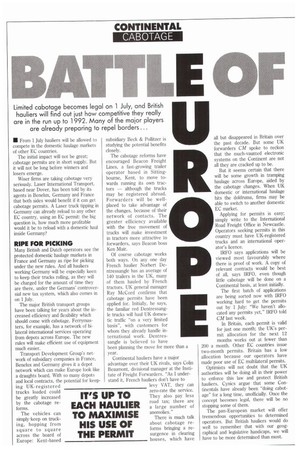BATTLE COIF
Page 52

If you've noticed an error in this article please click here to report it so we can fix it.
Limited cabotage becomes legal on 1 July, and British hauliers will find out just how competitive they really are in the run up to 1992. Many of the major players are already preparing to repel borders...
• From 1 July hauliers will be allowed to compete in the domestic haulage markets of other EC countries.
The initial impact will not be great; cabotage permits are in short supply. But it will not be long before winners and losers emerge.
Wiser firms are taking cabotage very seriously. Laser International Transport, based near Dover, has been told by its agents in Benelux, Germany and France that both sides would benefit if it can get cabotage permits. A Laser truck tipping in Germany can already reload to any other EC country, using an EC permit: the big question is, how much more profitable would it be to reload with a domestic haul inside Germany?
RIPE FOR PICKING
Many British and Dutch operators see the protected domestic haulage markets in France and Germany as ripe for picking under the new rules. And all hauliers working Germany will be especially keen to keep their trucks rolling, as they will be charged for the amount of time they are there, under the Germans' controversial new tax system, which also comes in on 1 July.
The major British transport groups have been talking for years about the increased efficiency and flexibility which should come with cabotage. Ferrymasters, for example, has a network of bilateral international services operating from depots across Europe. The new rules will make efficient use of equipment much easier.
Transport Development Group's network of subsidiary companies in France, Benelux and Germany gives it a depot network which can make Europe look like a draughts board. With so many depots and local contracts, the potential for keeping UK-registered trucks loaded could be greatly increased by the cabotage reforms.
The vehicles can simply 'keep on trucking, hopping from square to square across the board of Europe: Kent-based subsidiary Beck & Pollitzer is studying the potential benefits closely.
The cabotage reforms have encouraged Beacon Freight Lines, a fast-growing trailer operator based in Sittingbourne, Kent, to move towards running its own tractors — although the trucks may be registered abroad. Forwarders will be wellplaced to take advantage of the changes, because of their network of contacts. The greater efficiency available with the free movement of trucks will make investment in tractors more attractive to forwarders, says Beacon boss Ken Muir.
Of course cabotage works both ways. On any one day French haulier Norbert Dentressangle has an average of 140 trailers in the UK, many of them hauled by French tractors. UK general manager Ray McCord confirms that cabotage permits have been applied for. Initially, he says, the familiar red Dentressangle trucks will haul UK domestic traffic "on a very limited basis", with customers for whom they already handle international work. Dentressangle is believed to have been planning the move for more than a year.
Continental hauliers have a major advantage over their UK rivals, says Colin Beaumont, divisional manager at the Institute of Freight Forwarders. "As I understand it, French hauliers don't have to levy VAT, they can zero-rate the service. They also pay less road tax; there are a large number of anomalies."
There is much talk about cabotage reforms bringing a resurgence in clearing houses, which have
all but disappeared in Britain over the past decade. But some UK forwarders CM spoke to reckon that the much-vaunted electronic systems on the Continent are not all they are cracked up to be.
But it seems certain that there will be some growth in tramping haulage across Europe, aided by the cabotage changes. When UK domestic or international haulage hits the doldrums, firms may be able to switch to another domestic EC market.
Applying for permits is easy; simply write to the International Road Freight Office in Newcastle. Operators seeking permits in this country must have UK-registered trucks and an international operator's licence.
IRFO says applications will be viewed most favourably where there is proof of work. A copy of relevant contracts would be best of all, says IRFO, even though little cabotage will be done on a Continental basis, at least initially.
The first batch of applications are being sorted now with IRFO working hard to get the permits out by 1 July: "We haven't allocated any permits yet," IRFO told CM last week.
In Britain, each permit is valid for just one month; the UK's permit allocation for the next 12 months works out at fewer than 200 a month. Other EC countries issue two-month permits. Britain has a low allocation because our operators have made poor use of EC multilateral permits.
Optimists will not doubt that the UK authorities will be doing all in their power to enforce this law and protect British hauliers. Cynics argue that some Continentals have already been "doing cabotage" for a long time, unofficially. Once the concept becomes legal, there will be no stopping some of them.
The pan-European market will offer tremendous opportunities to determined operators. But British hauliers would do well to remember that with our geographical and legislative handicaps, we will have to be more determined than most.




















































































































